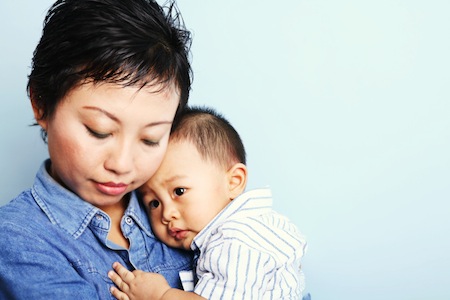The most important question you could ask a new mom is how she’s doing. How she’s really doing.
One of the most common things to emerge after I recently started to speak more openly about my struggle with severe postpartum mental illness (postpartum psychosis) was the amount of people who told me that they had no idea. Many expressed their surprise at the extent of what we, as a family, were going through and some hadn’t picked up on it at all. “But you always look so happy and together,” is something I heard repeatedly. This most recent reaction reminded me of the very early days of my illness when I “came out” to some of the women in my mothers’ group. No one saw it coming. I hid it well.
Perhaps, as an attempt to maintain some semblance of control over the chaos of my inner reality, I ensured that each time I left the house, my hair was done, I’d slapped some BB cream on my face, and there was no trace of baby vomit. Admittedly, thanks only to good genes, I was also one of those annoying women who slips back into her pre-pregnancy clothing about a week after giving birth. I did not look like a new mom, let alone a new mom who was struggling.
Each week, I’d take myself off to my mothers’ group (some folks call it a play group), takeaway coffee in one hand, pushing my shiny new stroller with the other. If I was having a particularly bad day, a day when I couldn’t get out of bed, I’d send the girls a text saying that my baby was sleeping or that we had something else to do. The truth, that I was sitting alone in the house, tears plummeting down my face with a baby who wouldn’t breastfeed, didn’t seem appropriate to share with a group of women I’d only just met. My attendance at mothers’ group was a little like most people’s Facebook pages: They only saw my best self.
And that’s one of the biggest problems with mothers’ groups isn’t it? The idea is wonderful in theory and admittedly, it was an excellent way to navigate the shock of new motherhood with a group of people going through the exact same things at the exact same time. And yet, despite this, I found it painfully isolating. Being part of a mothers’ group only made me feel more alone. Why wasn’t I enjoying motherhood and embracing my new role, like everyone else?
I was lucky to be grouped with a great bunch of women. Everyone was brutally honest about the crappy parts. My loneliness wasn’t a result of people not telling the truth or not sharing their own challenges. We were all exhausted, overwhelmed, and adjusting to our new identities. I just didn’t seem to be adjusting quite as well. And yet you wouldn’t have known.
I pasted on a smile and formed close friendships with a couple of women—women I still call good friends today. And gradually, I found myself revealing a little more, carefully constructed snippets of how I was struggling being at home, struggling with the lack of stimulating conversation and adult company, with the sleep deprivation and the sense of an identity adrift. And yet I held onto the really dark thoughts. I realized, after probing, that no one else felt the way I did. I simply wasn’t “normal.”
I fooled so many people for so many months—my husband included. Somehow, admitting that I was drowning and severely depressed when it was supposed to be “the happiest time of my life,” didn’t seem like something I was able to do. I was “failing” at motherhood. But no one else needed to know.
As I fell sicker and sicker, however, it was harder to hide. I lost weight. Became scrawny. When I see old photos of myself now, taken during that period, there’s an obvious absence of light in my eyes. When I finally sought help and started tentatively voicing some of my feelings, my anxieties, my thoughts, the reactions I received made me realize I wasn’t OK. I was far from OK. And when I started to tell the truth, the support I received from the girls in my mothers’ group was truly humbling. I wished I’d spoken up sooner.
I suppose what I’m saying is that there are many faces of postpartum mental illness. I saw this first hand, during my three-week stay at a mother and baby unit when my son was 7 months old. The clichéd image of the teary, exhausted mother with the unwashed hair is only one of these. That woman with the perfect makeup and the beautifully dressed baby who somehow manages to bring freshly baked cupcakes to each mothers’ group might be another one.
If you’re part of a new mothers’ group, I’d encourage you to look out for one another. Look after one another. And if you’re visiting a new mom, don’t forget to ask her how she’s doing. How she’s feeling. How she’s really feeling. It might just be the question she’s been waiting for.
Ariane is a 29-year-old mom of one who is looking forward to her approaching 30th birthday, as odd numbers make her nervous. She holds Peppa Pig responsible for recently teaching her son the word “why?” and is not to be left unsupervised in secondhand book stores. You can find her on twitter @Ariane_JMS.
Related Links:

